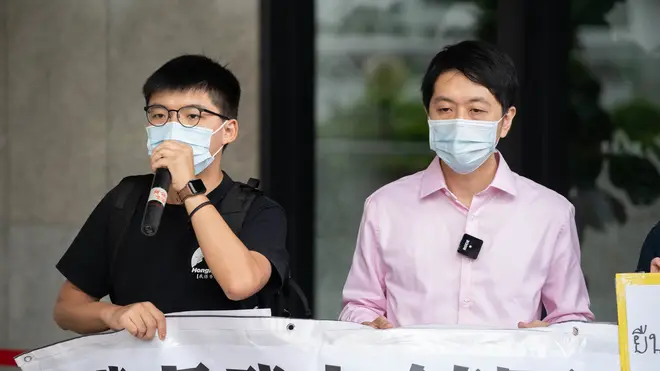
Richard Spurr 1am - 4am
3 December 2020, 16:00

A Hong Kong pro-democracy activist and former politician said that he will move to Britain in exile as a "safe haven" from the Chinese communist party.
Former politician and pro-democracy campaigner, Ted Hui, has announced that he will withdraw his membership of the Democratic Party of Hong Kong in order to live in Britain.
Britain has extended residency rights for up to three million citizens of the former British colony, in response to Hong Kong's crackdown on anti-government protests, allowing them to live and work in the country for five years.
Mr Hui was arrested in Hong Kong in May over an incident in the country's legislative council in which he dropped a rotten plant and attempted to kick it at the body's president.
He was able to get his passport back from the government and a visa after receiving an invitation from Danish politicians to travel to Denmark, where he arrived on Tuesday.
Speaking in a statement, he said: "I hereby announce that I will go into exile and will withdraw my membership in the Democratic Party of Hong Kong to leave Hong Kong.
"There is no word to explain my pain and it's hard to hold back tears.
"My personal determination is that my exile will not be a migration.
"My only home is Hong Kong which is why I will not apply for asylum in any country.
"I will wait for the day that I can go home with the bells of freedom ringing in a free Hong Kong.
"Until my last breath I will fight to the end. Revive Hong Kong, revolution now!"
Read more: Pfizer/BioNTech vaccine approved for UK use and will roll out next week
Read more: Take vaccine or restrictions will 'almost certainly' endure, warns Van-Tam

China's new national security law violates Hong Kong's autonomy
Since the start of anti-government protests in June 2019, Hong Kong police have made more than 10,000 arrests.
Prominent pro-democracy figures who have been arrested include activists Joshua Wong and Agnes Chow, as well as media tycoon Jimmy Lai, an outspoken advocate for democracy.
Activists have accused the Hong Kong government and the central Chinese government in Beijing of tightening control over the semi-autonomous territory in response to demands for more democracy.
They say authorities are destroying the autonomy promised to the city, a global financial centre with greater freedoms than mainland China.
Mr Hui's parents, wife and two young children left Hong Kong on a flight on Wednesday, Hong Kong online news portal HK01 reported.
It did not mention their destination.
Mr Hui has called on European nations to allow protesters in the territory as "a safe haven from the terror" of China's Communist Party.
The activist, who is currently visiting Denmark, said: "The situation in Hong Kong is getting worse by the day and it is important that the world knows that Hong Kong is no longer a free city."
Britain has extended residency rights for up to three million Hongkongers eligible for British National Overseas passports, allowing them to live and work there for five years.
Britain also has followed the United States, Australia and Canada in suspending extradition agreements with Hong Kong.
Hong Kong became a special administrative region of China in 1997 after Britain returned control of the territory to Beijing, which promised its autonomy over local affairs for 50 years.
Beijing imposed the national security law in response to protests in Hong Kong that began in June 2019 over a proposed extradition law and expanded to include demands for greater democracy.
The sweeping legislation prompted more public protests and led to complaints that Beijing is violating the autonomy promised to Hong Kong when it returned to China, and damaging its status as a business centre.